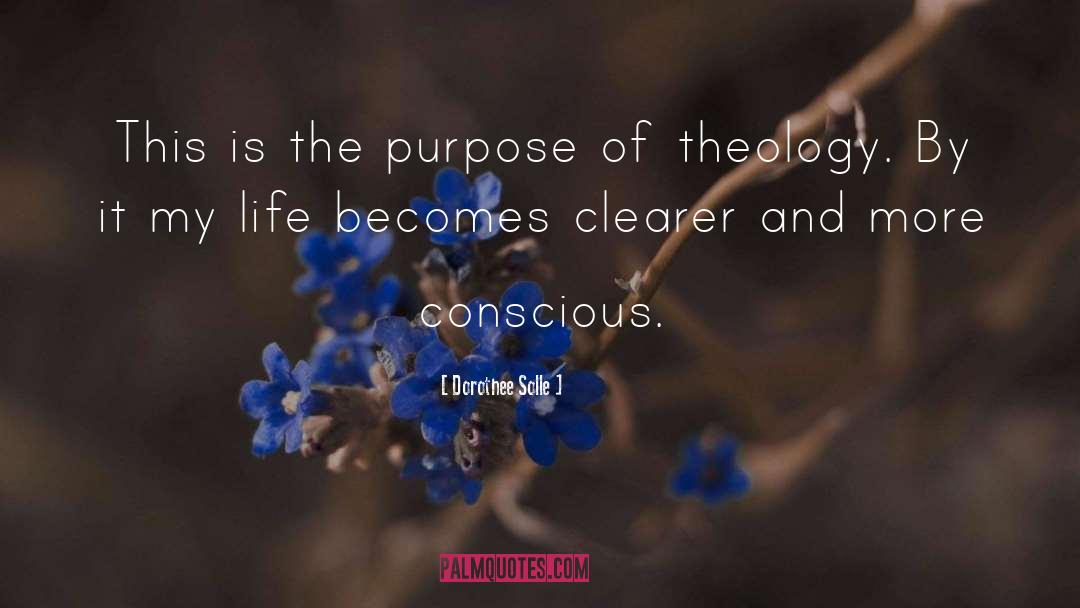Dorothee Solle Famous Quotes
Reading Dorothee Solle quotes, download and share images of famous quotes by Dorothee Solle. Righ click to see or save pictures of Dorothee Solle quotes that you can use as your wallpaper for free.
Every acceptance of suffering is an acceptance of that which exists. The denial of every form of suffering can result in a flight from reality in which contact with reality becomes ever thinner, ever more fragmentary. It is impossible to remove oneself totally from suffering, unless one removes oneself from life itself, no longer enters into relationships, makes oneself invulnerable.
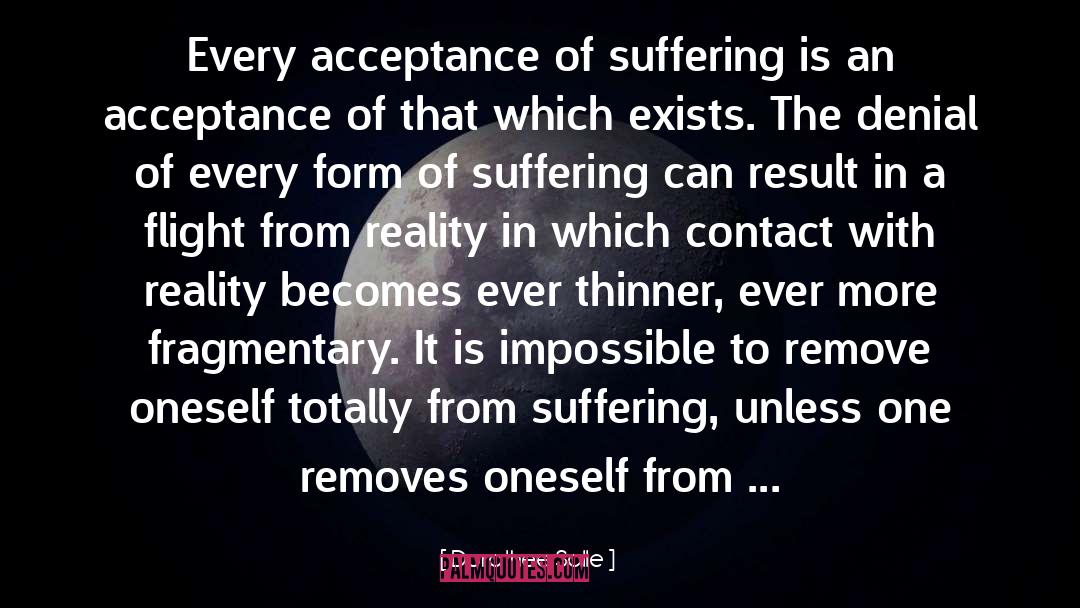
The trivialization of life is perhaps the strongest anti-mystical force among us. Some people are literally obsessed by the compulsion to trivialize everything . . . For mystical consciousness, it is essential that everything internal become external and be made visible. A dream wants to be told, the "inner light" wants to shine, the vision has to be shared . . . It is so easy to douse the inner light of a human being. And we busily assist in doing just that as we learn to make the world's efficiency our own. We cut ourselves off from our own experiences by looking upon them as irrelevant and not worth talking about or, what is no less cynical, not communicable at all. We are losing dreams, those of the night and those of the day, and increasingly we lose the visions of our life.
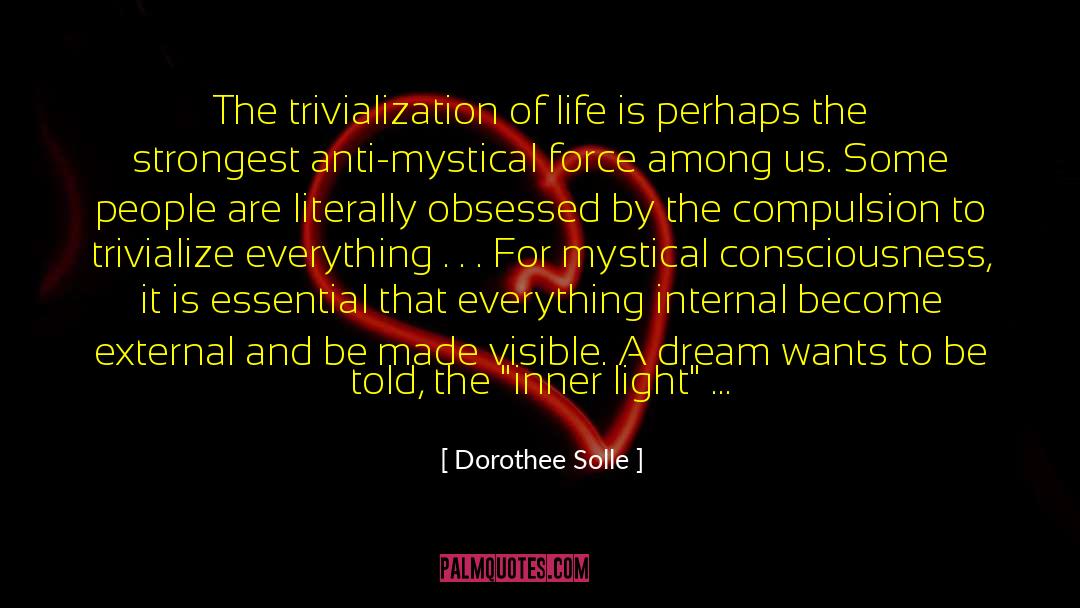
Our whole life consists of despairing of an answer and seeking an answer.
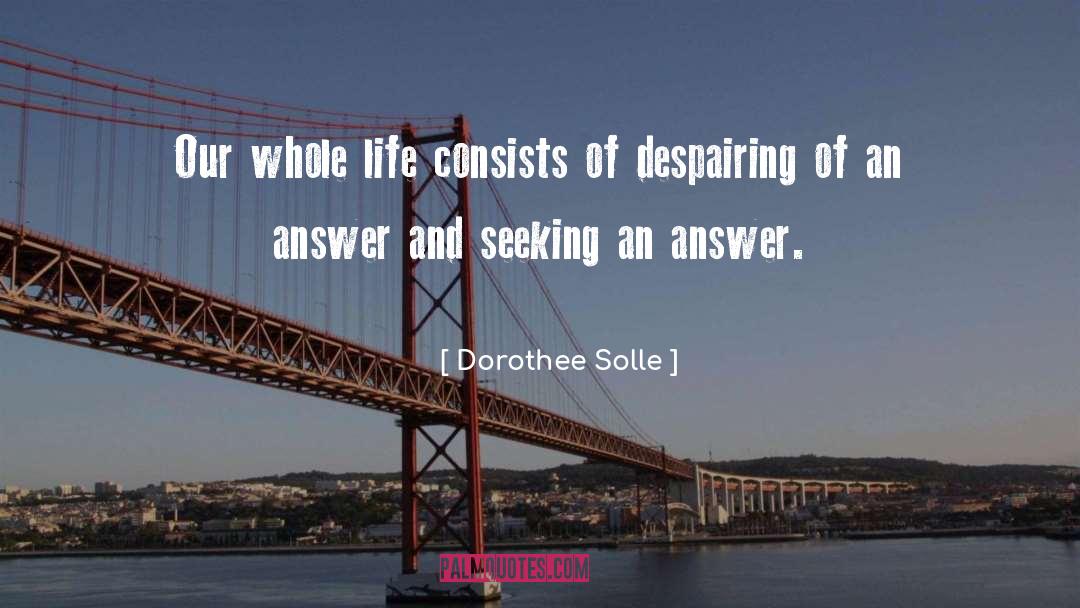
The connection between radical attentiveness, prayer, and joy pervades Jewish mystical thinking in its diverse phases but never so brightly, so every-day-related, and so clearly as in Hasidism. Melancholy is the dust in the soul that Satan spreads out. Worry and dejection are seen to be the roots of every evil force. Melancholy is a wicked quality and displeasing to God, says Martin Buber.
Rabbi Bunam said: "Once when I was on the road near Warsaw, I felt that I had to tell a certain story. But this story was of a worldly nature and I knew that it would only rouse laughter among the many people who had gathered about me. The Evil Urge tried very hard to dissuade me, saying that I would lose all those people because once they heard this story they would no longer consider me a rabbi. But I said to my heart: `Why should you he concerned about the secret ways of God?' And I remembered the words of Rabbi Pinhas of Koretz: 'All joys hail from paradise, and jests too, provided they are uttered in true joy' And so in my heart of hearts I renounced my rabbi's office and told the story. The gathering burst out laughing. And those who up to this point had been distant from me attached themselves to me." (a quote from Tales of the Hasidim by Martin Buber).
Joy, laughter, and delight are so powerful because, like all mysticism, they abolish conventional divisions, in this case the division between secular and sacred. The often boisterous laughter, especially of wome
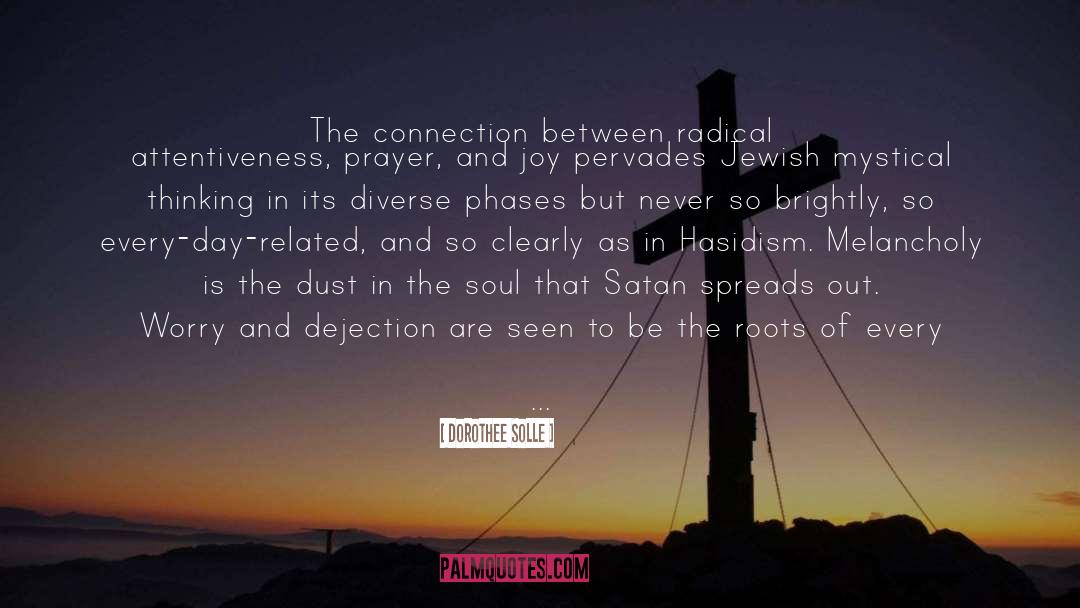
Religion does not confirm that there are hungry people in the world; it interprets the hungry to be our brethren whom we allow to starve.
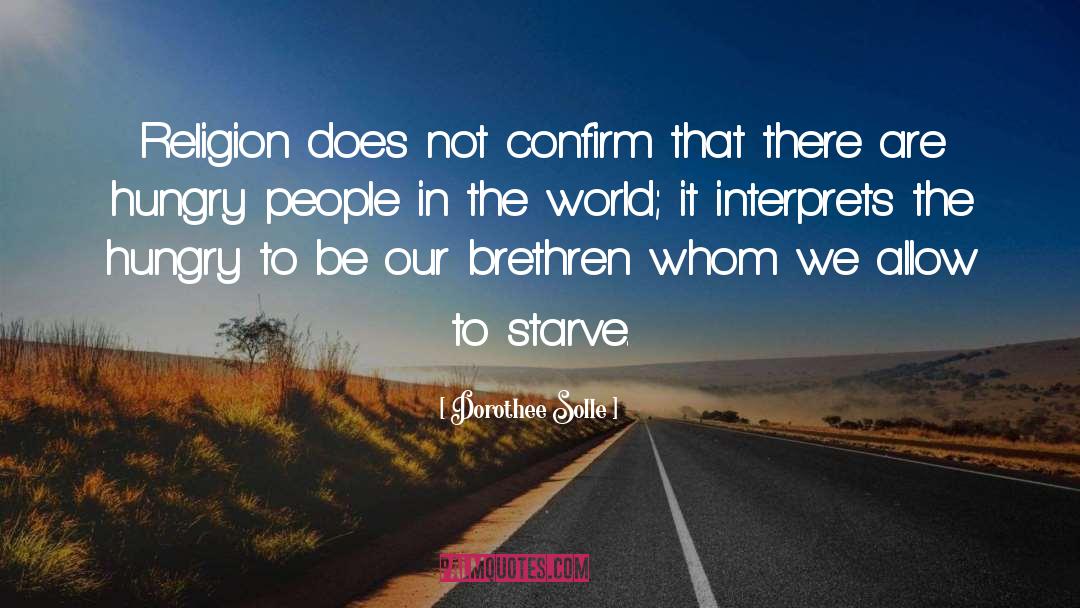
There is no wrong suffering. There is imaginary, sham, feigned, simulated, pretended suffering. But the assertion that someone suffers for the right or wrong reason presupposes a divine, all-penetrating judgment able to distinguish historically obsolete forms of suffering from those in our time, instead of leaving this decision to the sufferers themselves.
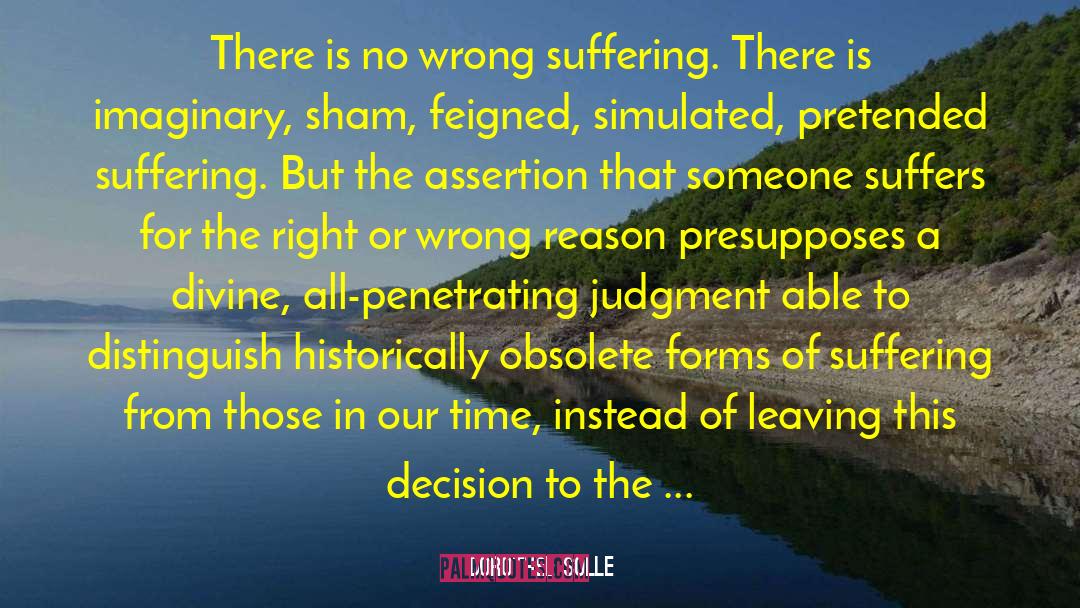
The desire to possess is marked by an unceasingly growing, voracious element that manifests itself in the simple desire to have more, but also in the growing dependency on consumerist habits that people do not want to give up. The ego loses its benign distance from things to be used and is ruled by the urge to possess them. This rapidly infects other aspects of life. Like objects that one wants to have available, partners, relatives, and friends come to he seen as having to he possessed.
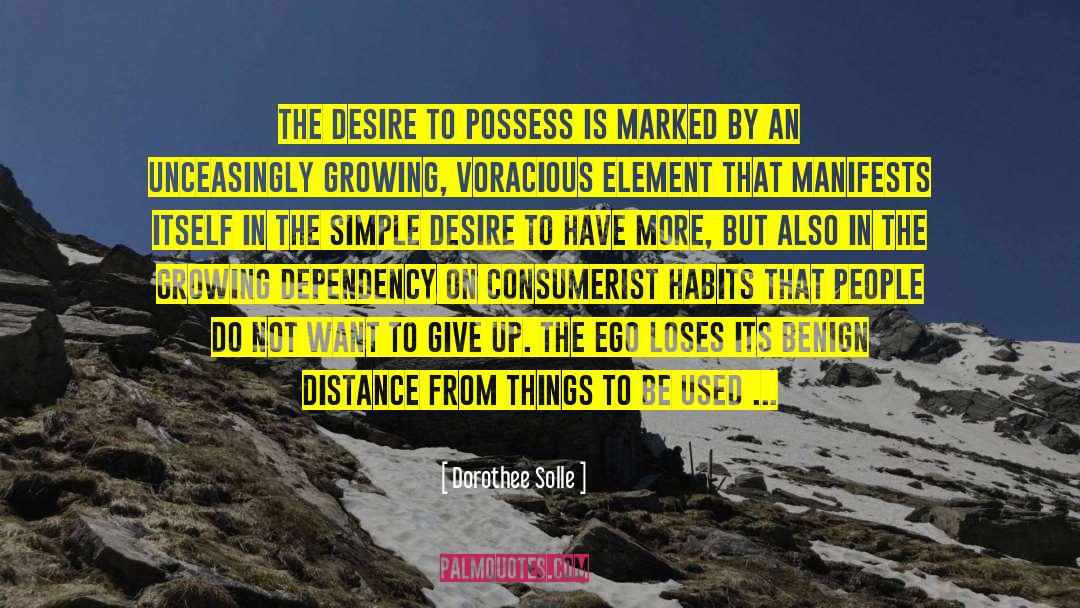
God has no other hands than ours.
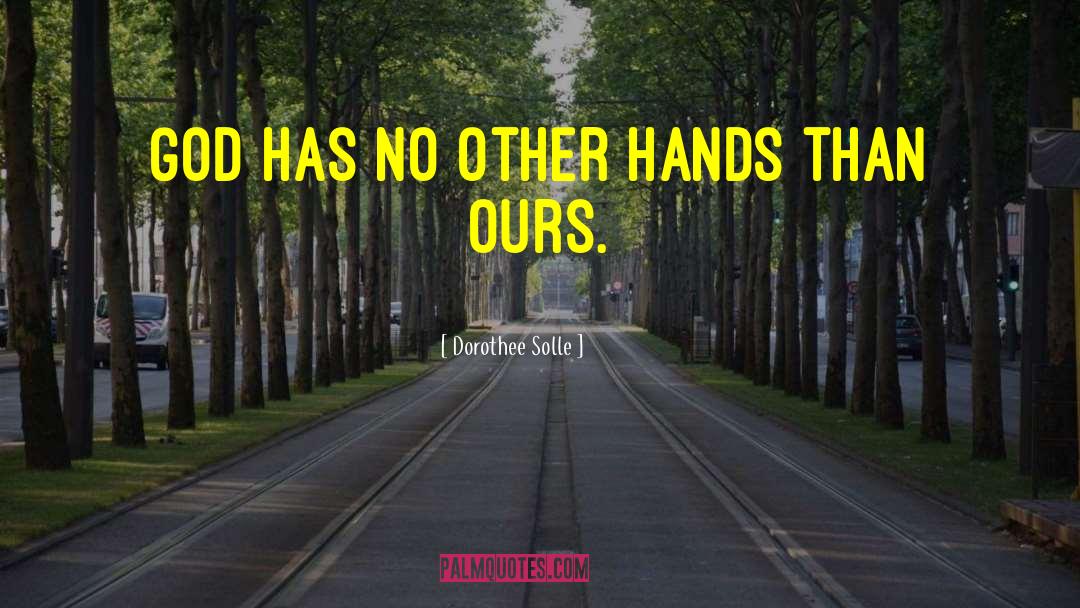
The basis of spiritual renewal is not the guilt feelings that frequently arise in sensitized individuals in rich industrial societies. Instead, it is a crazy mysticism of becoming empty that reduces the real misery of the poor and diminishes one's own slavery. Becoming empty or "letting go" of the ego, possession, and violence is the precondition of the creativity of transforming action.
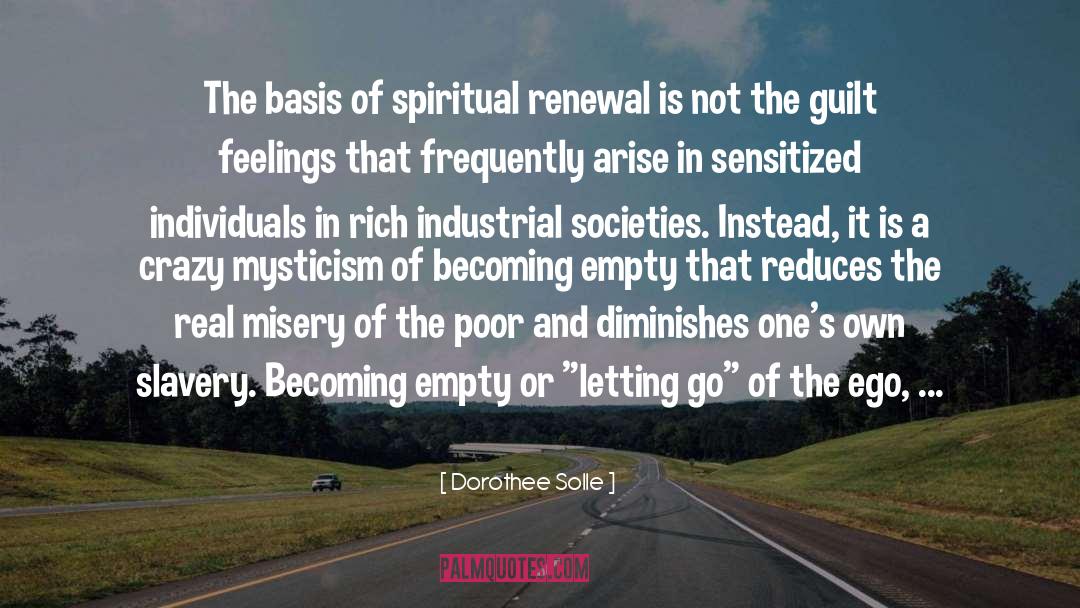
In such mysticism of prayer, the relationship of domination between God and humans has been transformed into one of love. That is precisely the mystical transformation that happens to prayer of supplication. The feudalistic patriarchal understanding of supplication often starts from the assumption that human beings have to go and knock on God's door and awaken "him" in order to present their petitions. The feudal lord then answers or refuses. If "he" has refused often enough even the most necessary things, the supplicant will go away and perhaps look elsewhere for salvation ...
Mystics have rarely cultivated the prayer of supplication; they have worked at a relationship based on mutuality.
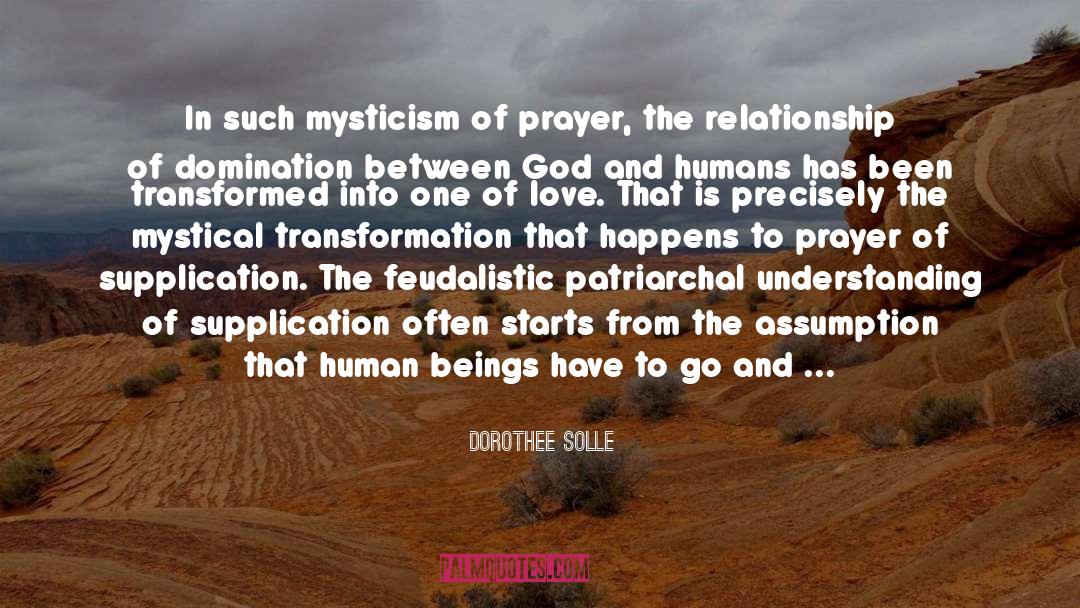
This kind of unmasking and refusing complicity is part of the simplicity of lifestyle. Simplicity, the rejection of consumerism and opting for possessionlessness, is a modern, social form of what medieval mysticism called "becoming unattached.
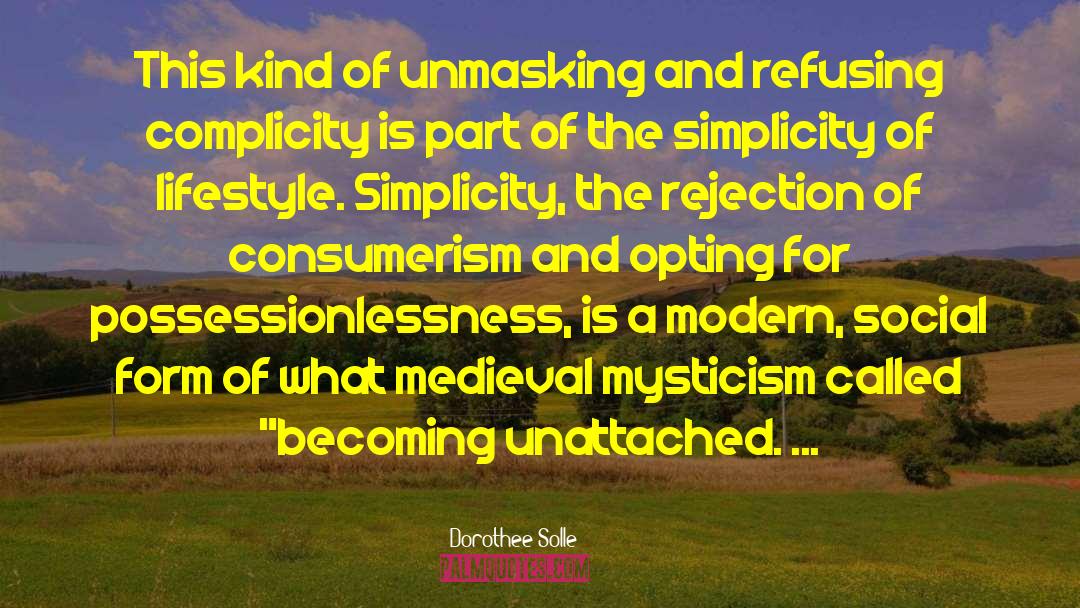
We are afraid of religion because it interprets rather than observance. Religion does not confirm that there are hungry people in the world; it interprets the hungry to be our brethren whom we allowed to starve.
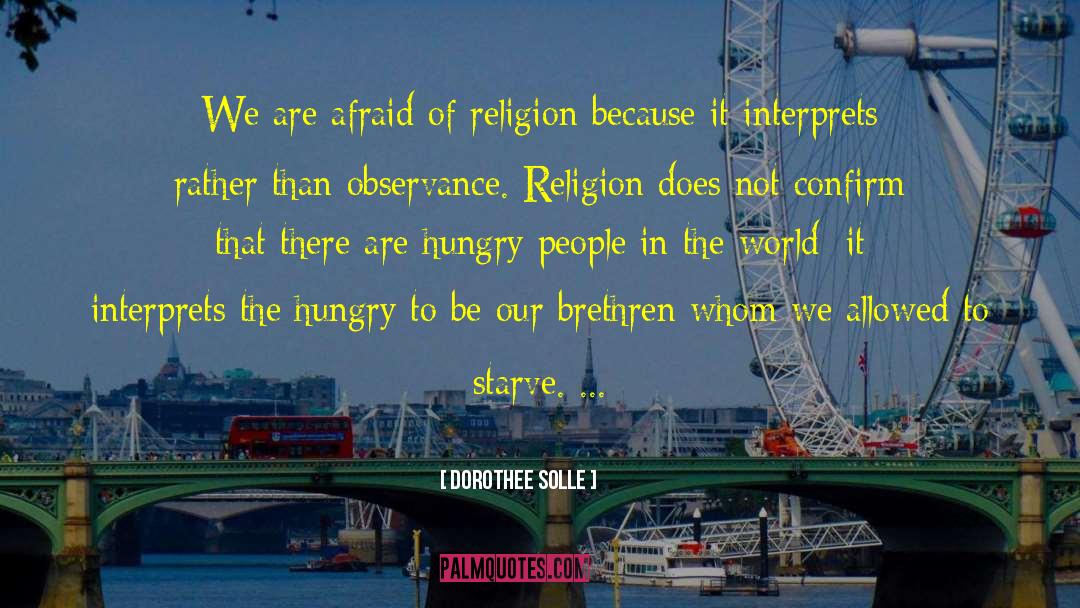
For me as a woman pride is not really sin, but rather something that I still have to learn. The male conception of the person who rebels against God by affirming himself, by acting proudly, arrogantly, and without constraints, is not a woman's concern. Rather, we women are in danger of not developing any pride, of never becoming independent, of constantly remaining within too narrow boundaries.
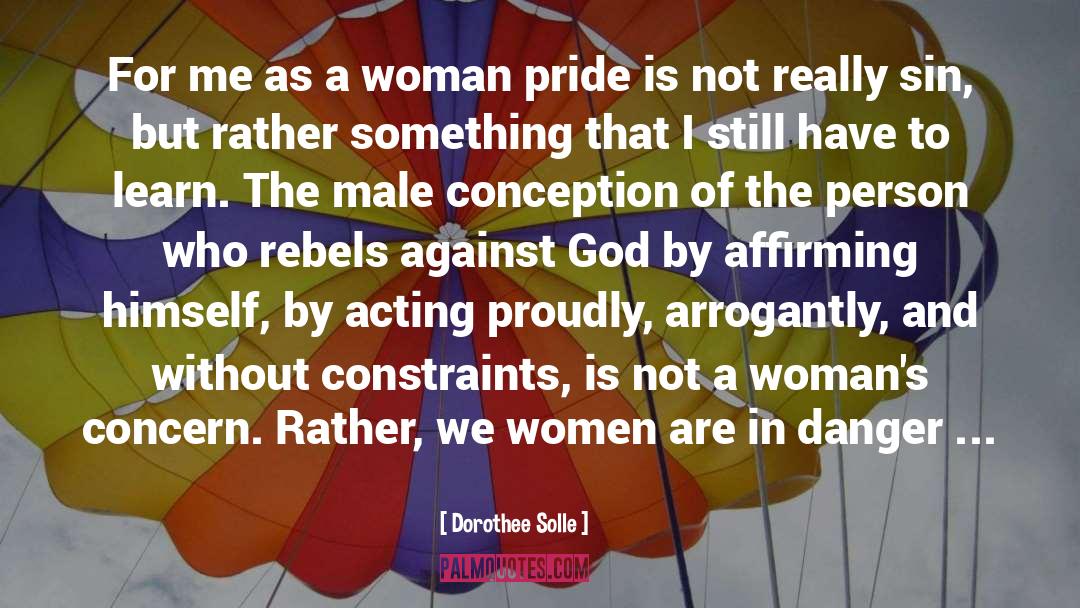
A language that takes our emotions seriously and gives them real weight in our lives encourages us to think and be and act differently.
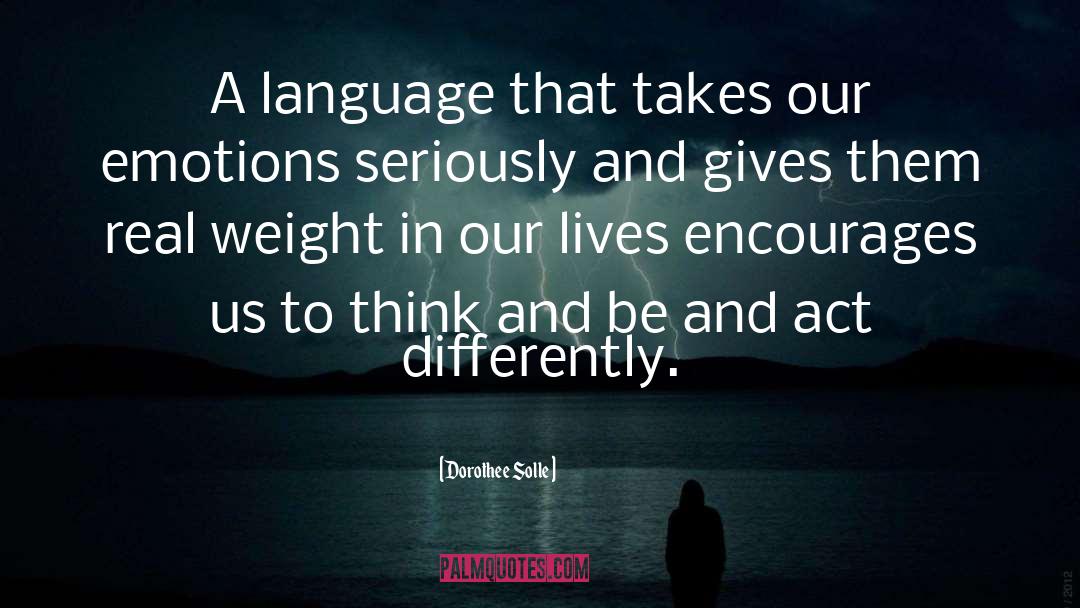
The author of the book of job wrestles with such questions. Can faith in God be free of ulterior motives and interests? Can there be such a thing at all? Is there something like pure religion that does not act from fear of punishment and that is not intent on reward? Or is religion always a deal, a transaction where people expect to reap well-being, fortunes here and beyond, health, wealth, and affirmation and enter into certain commitments as a result?
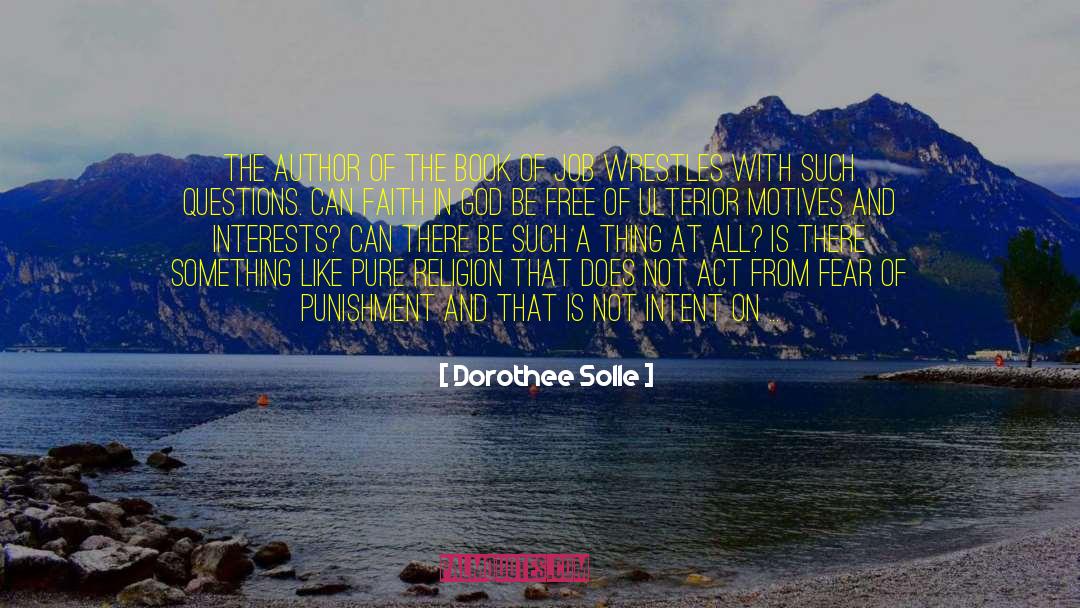
With the disappearance of God the Ego moves forward to become the sole divinity.
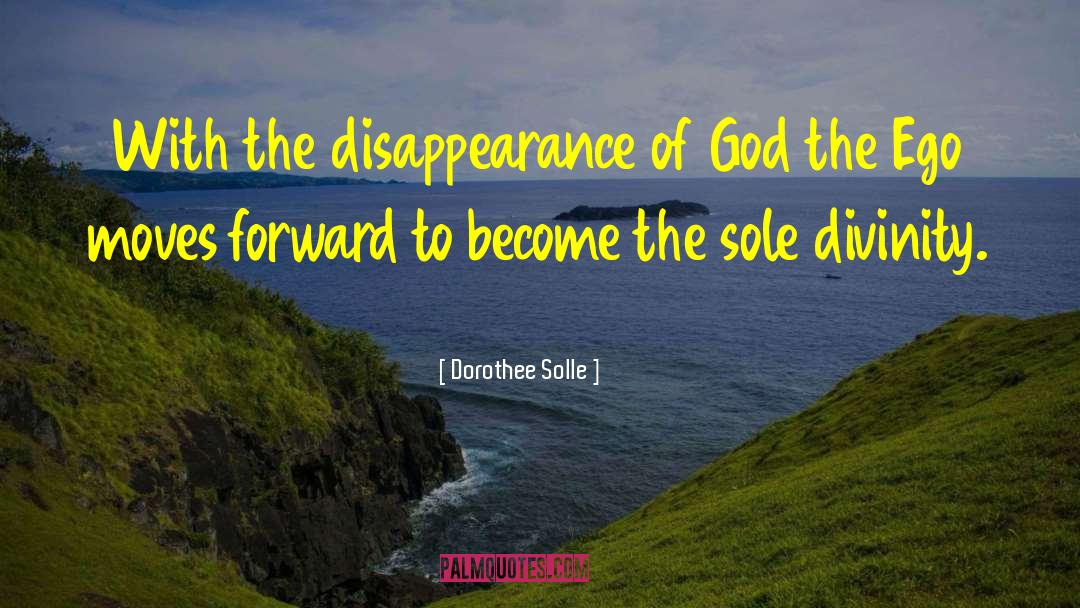
Religion is made up of unrestrained wishes.
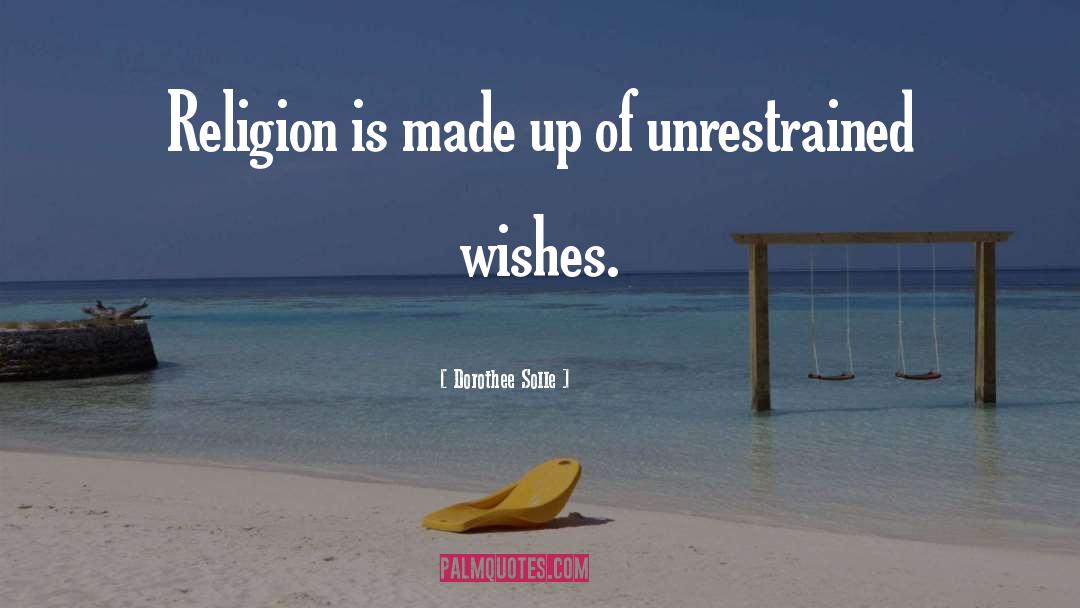
The topic of disinterested, non-calculating, and purposeless love for the sake of love is central to mysticism as such. To love God, not because of powerful institutions, or even because God commands it, but to do so in an act of unencumbered freedom, is the very source of mystical relation. To love God is all the reason there needs to be . . . The orthodoxies that have been handed down to us in the monotheistic religions called for obedience to the commanding God. They threatened with punishment and enticed with rewards - images of hell and heaven resting on that authority. In technologically advanced centers of the world, authoritarian religious systems are in sharp decline. Mystical perceptions and approaches to God, however, are entirely different: "God, if I worship Thee in fear of hell, burn me in hell. And if I worship Thee in hope of Paradise, exclude me from Paradise; but if I worship Thee for Thine own sake, withhold not Thine everlasting Beauty" (Aldous Huxley, in The Perennial Philosophy). Mysticism may he regarded as the anti-authoritarian religion per se. In it, the commanding lord becomes the beloved; what is to come later becomes the now; and naked or even enlightened self-interest that is oriented by reward and punishment becomes mystical freedom.
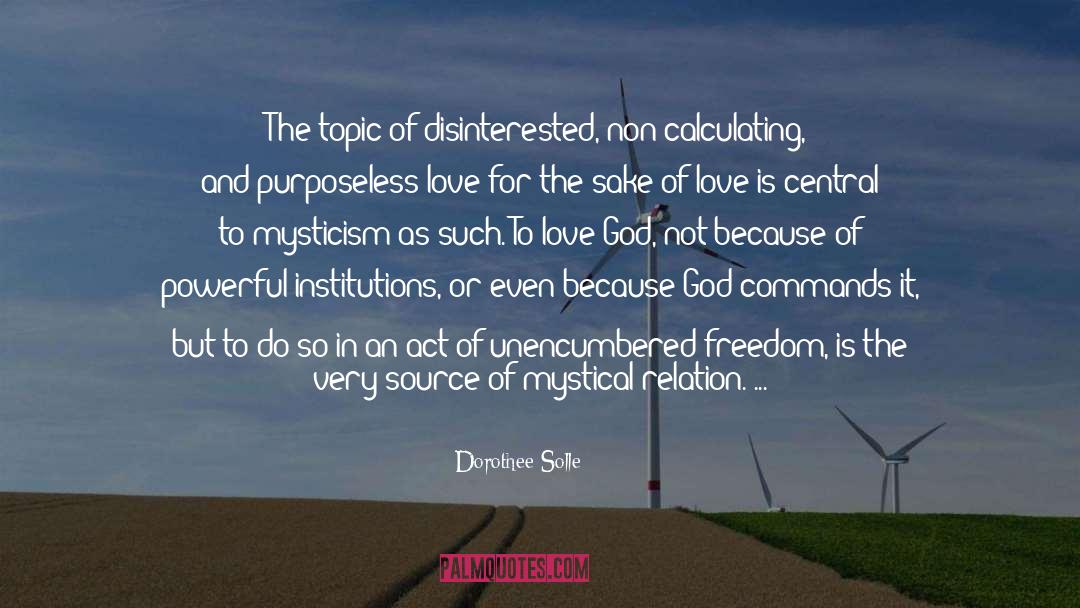
The story of the Good Samaritan (Luke 1o) can he interpreted mystically in such a way that the question of the knowledge of God becomes its focus. The priest and the Levite, who walk past the man who fell among robbers and was seriously hurt, are pious God-fearing persons. They "know" God and the law of God. They have God the same way that the one who knows has that which is known. They know what God wants them to be and do. They also know where God is to he found, in the scriptures and the cult of the temple. For them, God is mediated through the existing institutions. They have their God - one who is not to he found on the road between Jerusalem and Jericho.
What is wrong with this knowledge of God? The problem is not the knowledge of the Torah or the knowledge of the temple. (It is absurd to read an anti-Judaistic meaning into a story of the Jew Jesus, since it could just as well have come from Hillel or another Jewish teacher.) What is false is a knowledge of God that does not allow for any unknowing or any negative theology. Because both actors know that God is "this," they do not see "that." Hence the Good Samaritan is the anti-fundamentalist story par excellence.
"And so I ask God to rid me of God," Meister Eckhart says. The God who is known and familiar is too small for him.
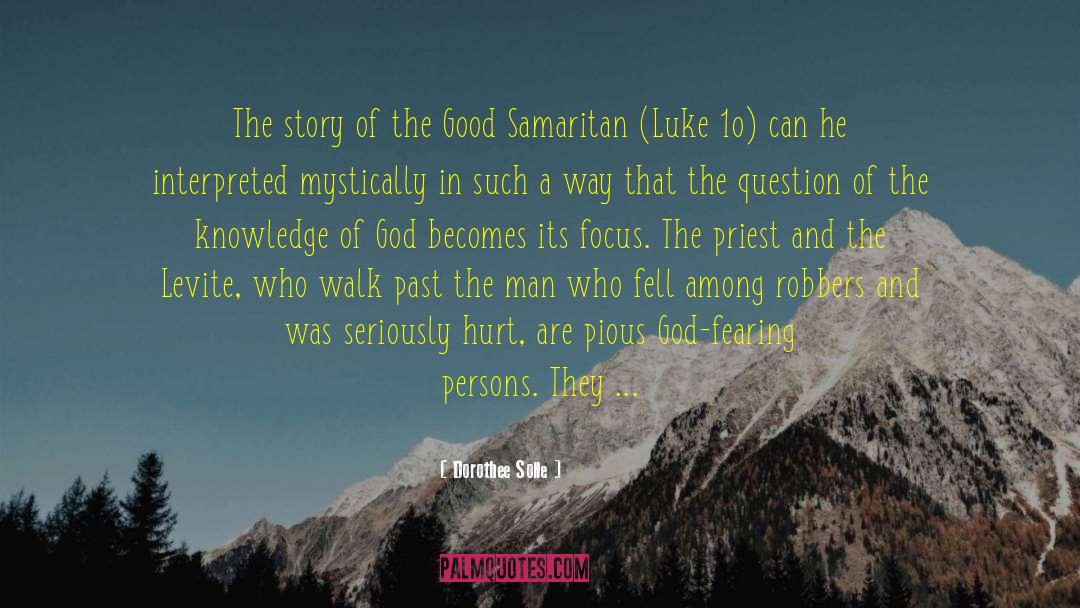
To he "over-choiced" with thirty different kinds of bread does indeed develop the shopper's awareness of differentiation and sense of taste. However, from the ego that is becoming dependent on such a surplus of choice, it also takes away the time and energy for other life pursuits. The ego is diverted and, with the help of the world of consumer goods, "turned in on itself" (bomo incur-vatus in se ipsum), as the tradition used to depict the sinner.
The least to he learned from the tradition of mysticism is that becoming empty in a world of surplus, learning to switch off, and limiting oneself are small steps in the liberation from consumerism, and that perhaps freedom cannot he imagined without letting go.
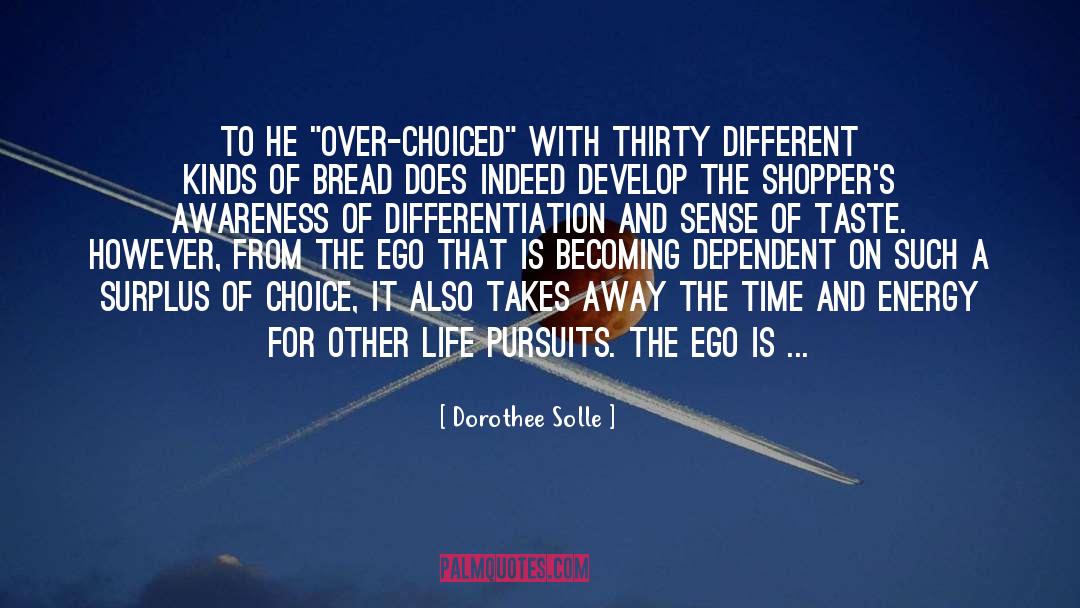
In cultures where asceticism developed and was practiced, people knew that one can suffocate when every option is a readily available one. Without self-limitation, without fixed boundaries - like those given in creation between day and night, summer and winter, being young and growing old-life loses its humanness. Asceticism means to renounce at least for periods of time the options that present themselves . . .
In rich societies, the fundamental idea of sacrifice is highly suspect; it contradicts the basic constitution of the world of affluence. Sacrifice, as well as those who are to do the sacrificing have indeed been much abused. Even so, voluntary sacrifice, freely renouncing status, and limiting career or other options available to oneself can consolidate one's capacity for happiness.
This seems very apparent to me in ecological resistance movements. No one can feel at home in a world that has to be bought and used up. We ourselves as well as the environment are damaged by consumerism; it dulls the senses so that people no longer know how to smell, taste, feel, and see.
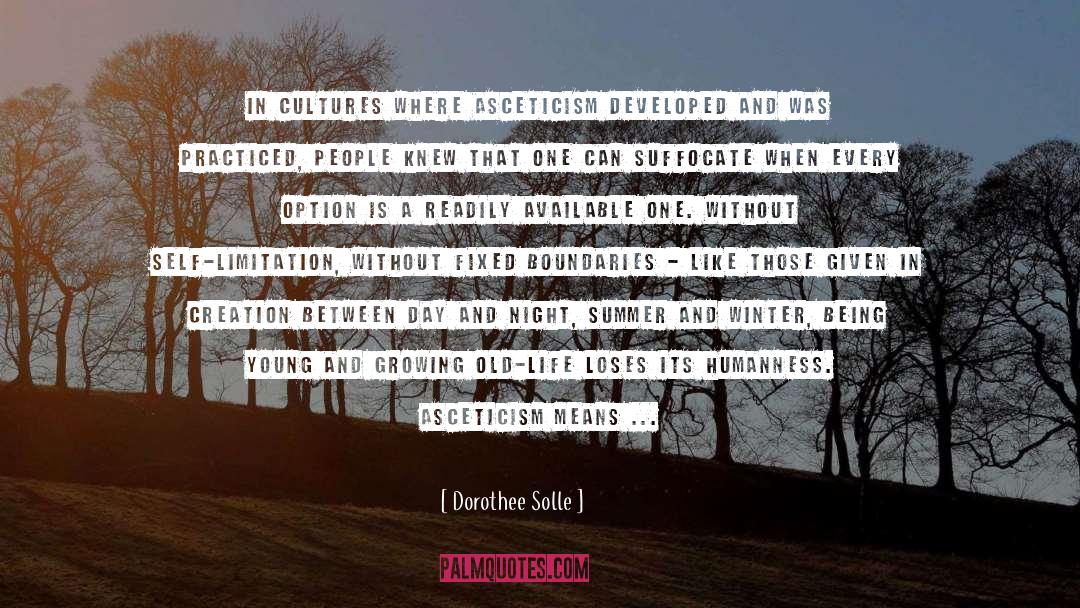
Luther's opponent in the Peasants' War, Thomas Muntzer is deeply rooted in mystic tradition . . . Muntzer calls the first step in preparing for God "wonderment": amazement and fright begin when the eternal Word comes into the human heart. "And this wonderment at whether it really is God's Word or not begins to happen when one is a child of six or seven years of age." . . .
Muntzer's interest in Gregorian chant and his attempt, rejected by Luther, to integrate it into the German mass, may perhaps be understood as a manifestation of his mystical love for wonderment.
In connection with "wonderment," Muntzer quotes from Deuteronomy: "But the word is very near you; it is in your mouth and in your heart" (30:14 RSV). . . This inward word, heard through God's revelation in the abyss of the soul, speaks to human beings without mediation, even without the Bible.
Muntzer opposed Luther in the understanding of Scripture. Muntzer's view of the living Word of God as being "so very close to you" - and which constitutes the first step of mystical cognition (cognitio experimen- talis) - represents a break with Luther's appeal for sola scriptura, (the Scriptures alone) as the basic principle of the Reformation puts it. What in the controversy over indulgences had served well in fighting the financial manipulations of the Church of Rome's authorities, namely this basic principle and its critical force, soon came to serve the consolidation of a new clerical dom
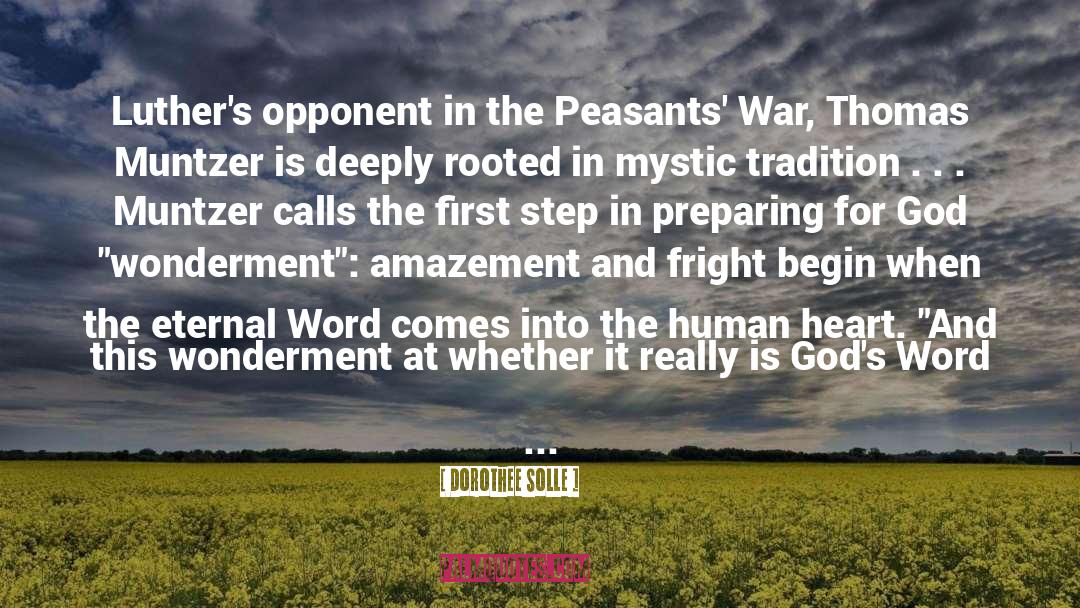
The more people anticipate the elimination of suffering the less strength they have actually to oppose it. Whoever deals with his personal suffering only in the way our society has taught him - through illusion, minimization, suppression, apathy - will deal with societal suffering in the same way.
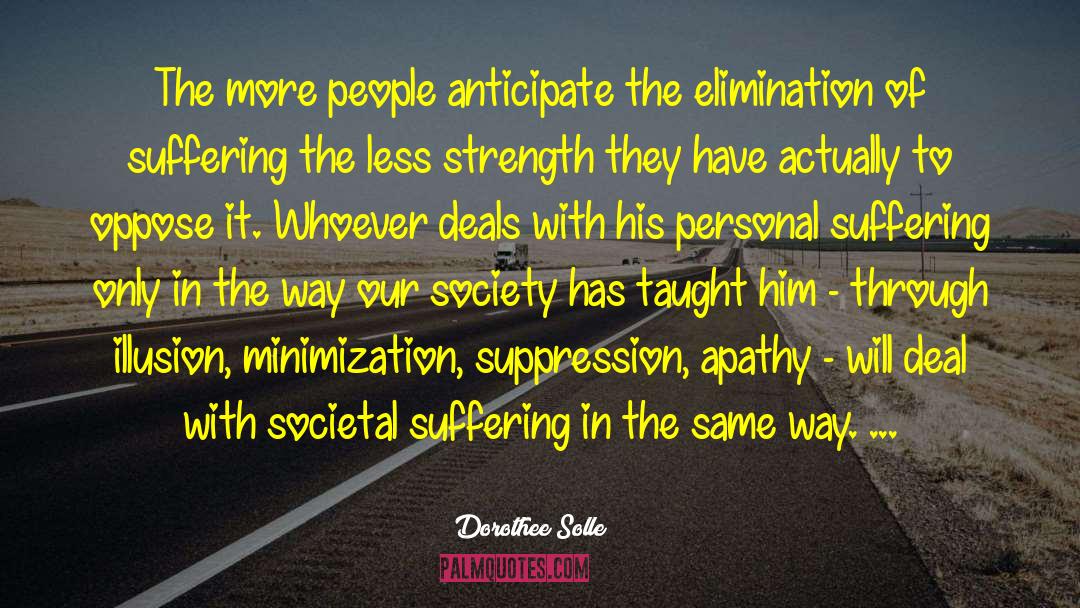
To take sides with life and experience how we can transcend ourselves is a process that has many names and faces. Religion is one of those names.
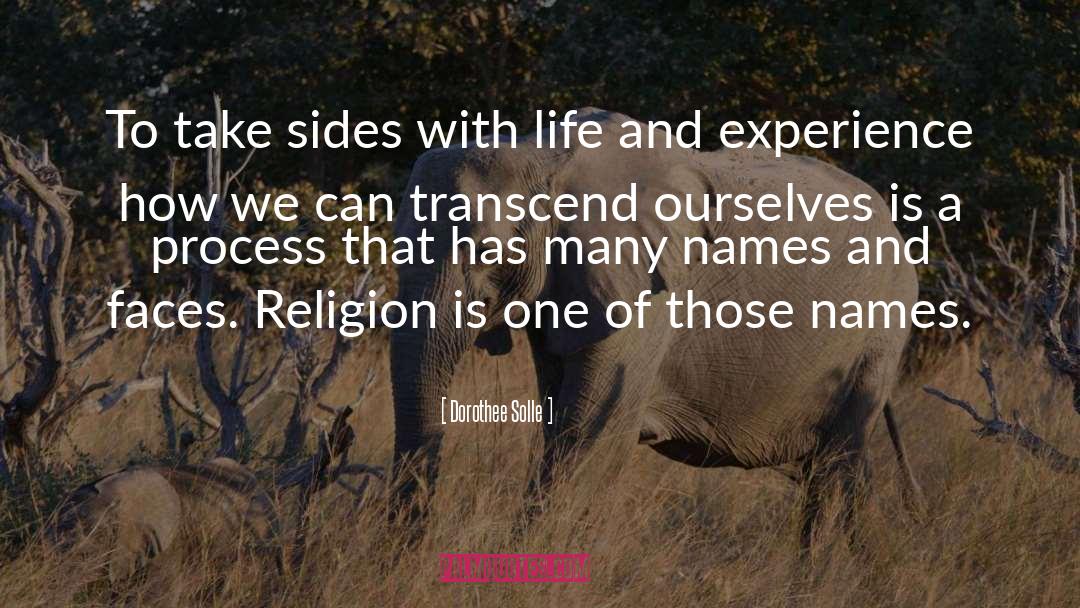
Really living like Christ will not mean reward, social recognition, and an assured income, but difficulties, discrimination, solitude, anxiety. Here, too, the basic experience of the cross applies: the wider we open our hearts to others, the more audibly we intervene against the injustice that rules over us, the more difficult our lives in the rich unjust society will become.
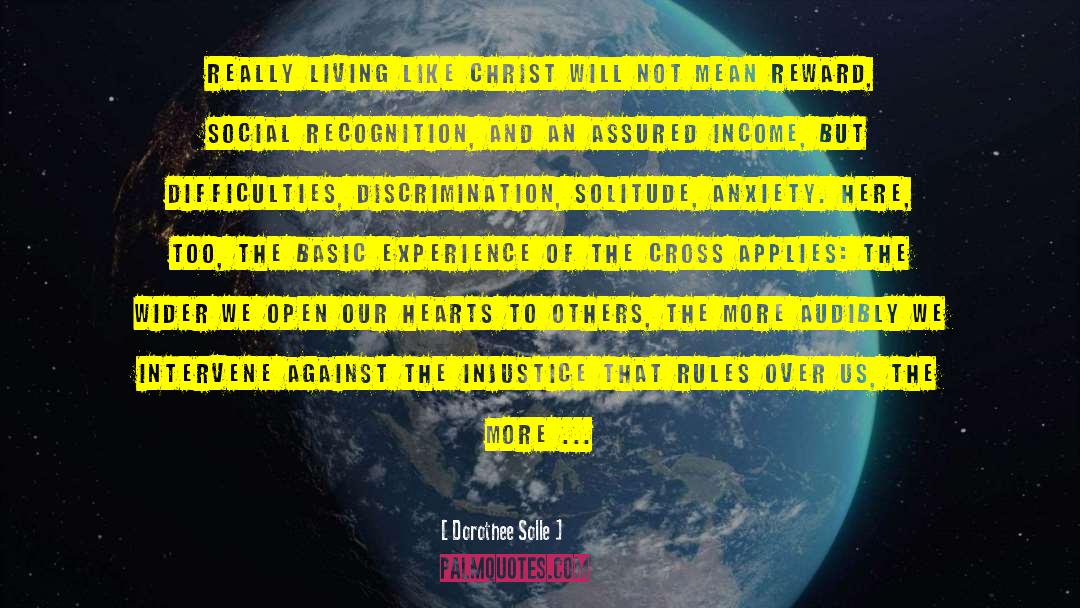
Can faith in God be free of ulterior motives and interests? Can there be such a thing at all? Is there something like pure religion that does not act from fear of punishment and that is not intent on reward? Or is religion always a deal, a transaction where people expect to reap well-being, fortunes here and beyond, health, wealth, and affirmation and enter into certain commitments as a result?
... the intent of Satan is to unmask religion. Piety, faith, and trust in God are all utilitarian aspects that the enlightened Satan sees through. They stand and fall with the expectation of reward, of a corresponding favor returned. Joh's friends are of the same opinion: suffering is to he understood only as just punishment.
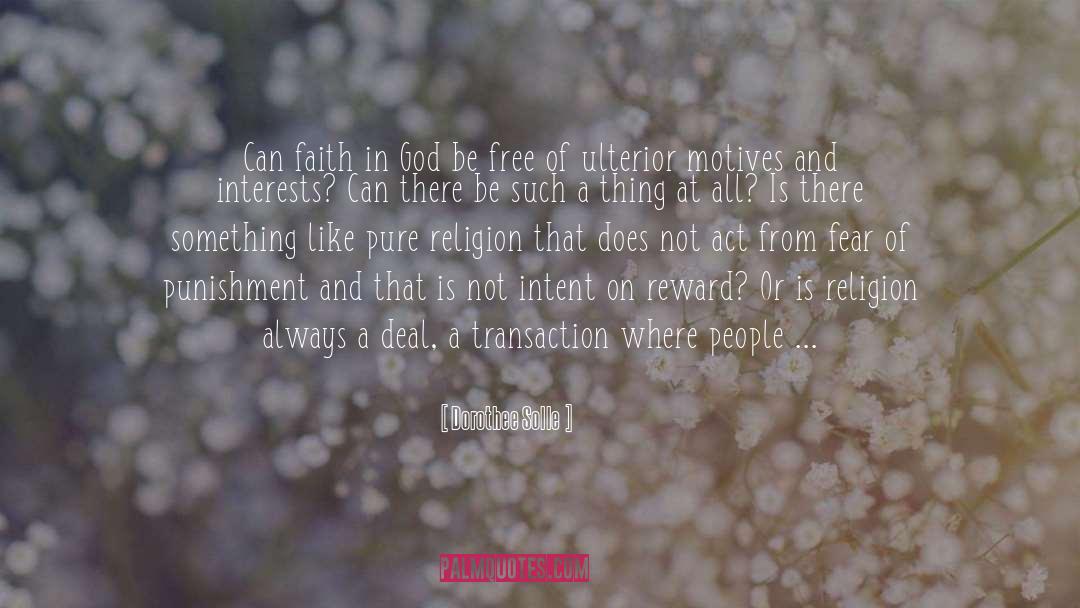
What is important is not what someone is but what he is waiting for. Not the events of life but its possibilities.
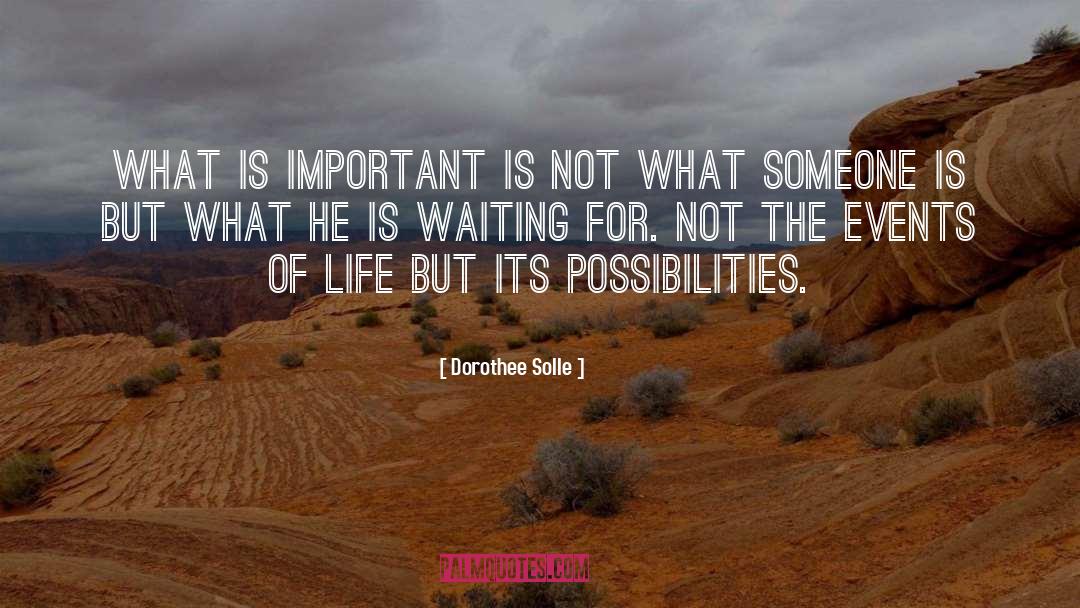
When he was twenty-three years old, he (George Fox) saw the inner light in a vision. For him it symbolized the spirit against the letter, silence against chatter, experience against dogma, and equality against all who build inequality on authority and power, be it of the state or religion. His mistrust of the official Anglican Church was immense. He spoke with disdain of the "towered houses" and was tormented by the ringing of church bells. He frequently interrupted preachers, standing in the church's doorway, a hat covering his head, and uttering threatening words toward the pulpit, causing great excitement in the gathered congregation. It often resulted in Fox being beaten up, banished, and, later on, jailed for years.
What aroused his ire, above all, were the priests who, without ever having experienced or even looked for illumination, presented themselves as servants of God but, in truth, comprised a "society of cannibals." It is "not enough to have been educated in Oxford or Cambridge in order to become capable for and efficient in the service of Christ.
To this day it is difficult for many Friends to speak of "Quaker theology." The Friends believe in Scripture - George Fox knew it by heart - but they also believe that the Spirit transcends Scripture and that the inner light is experienced by all human beings without human mediation. "The inner light," "the inward teacher" are names that the early Quakers gave to their experiences of the Spirit. T
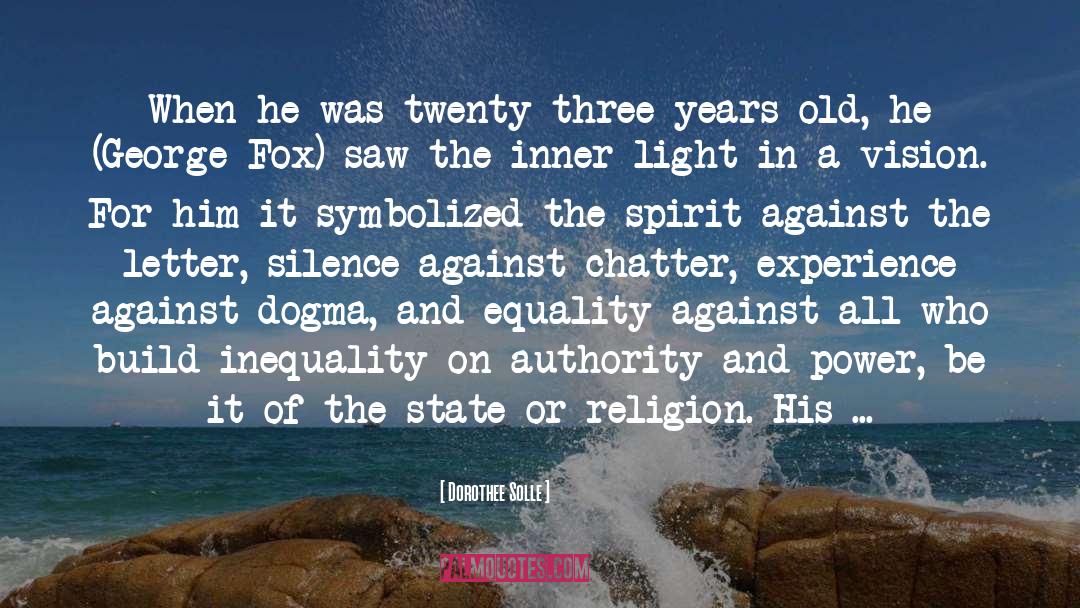
Toleration of exploitation, oppression, and injustice points to a condition lying like a pall over the whole of society; it is apathy, an unconcern that is incapable of suffering.
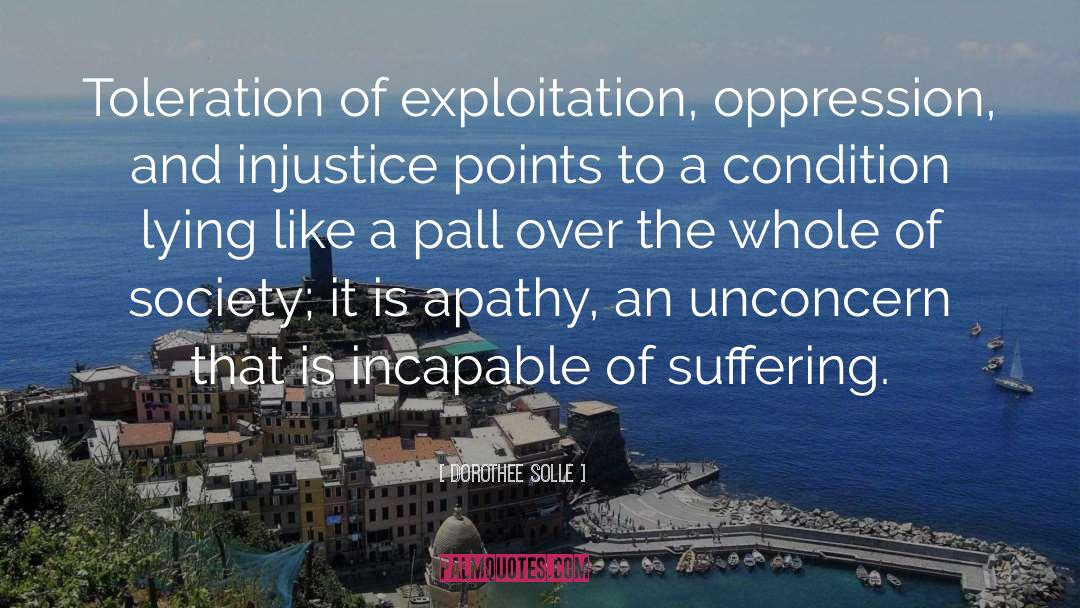
One of the oldest longings of all people of mystical sensibility is to be rid of disguises to the point of becoming naked.
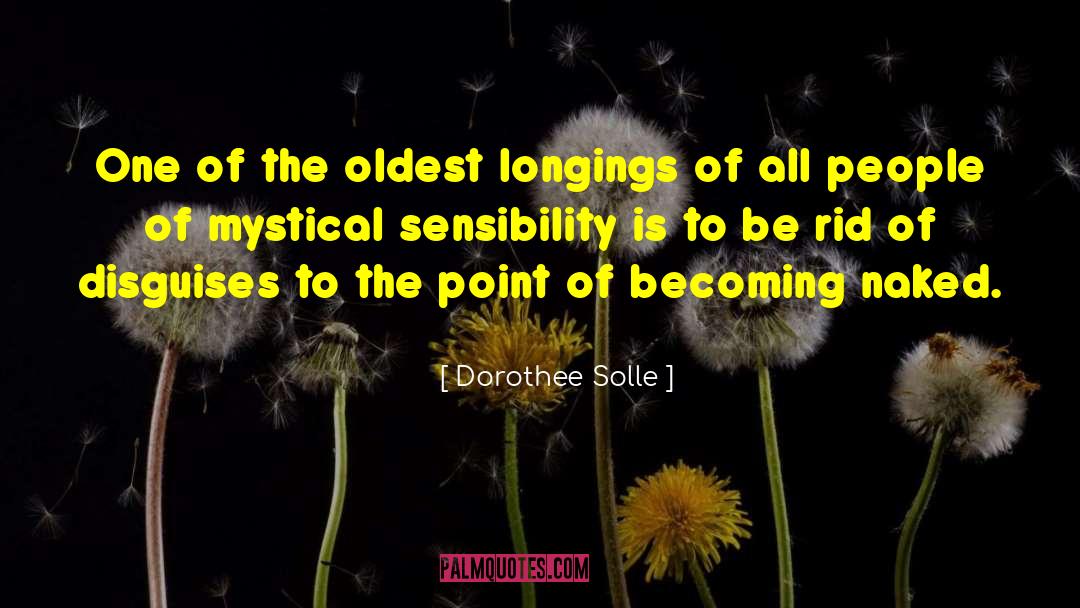
If my hands are fully occupied in holding on to something, I can neither give nor receive.
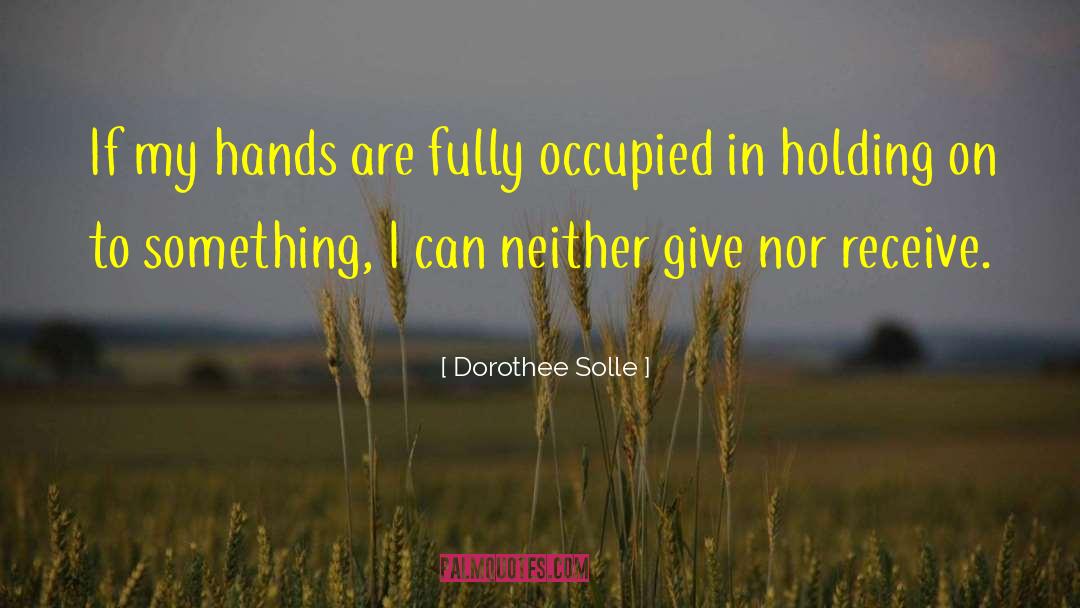
Death is what takes place within us when we look upon others not as gift, blessing, or stimulus but as threat, danger, competition.
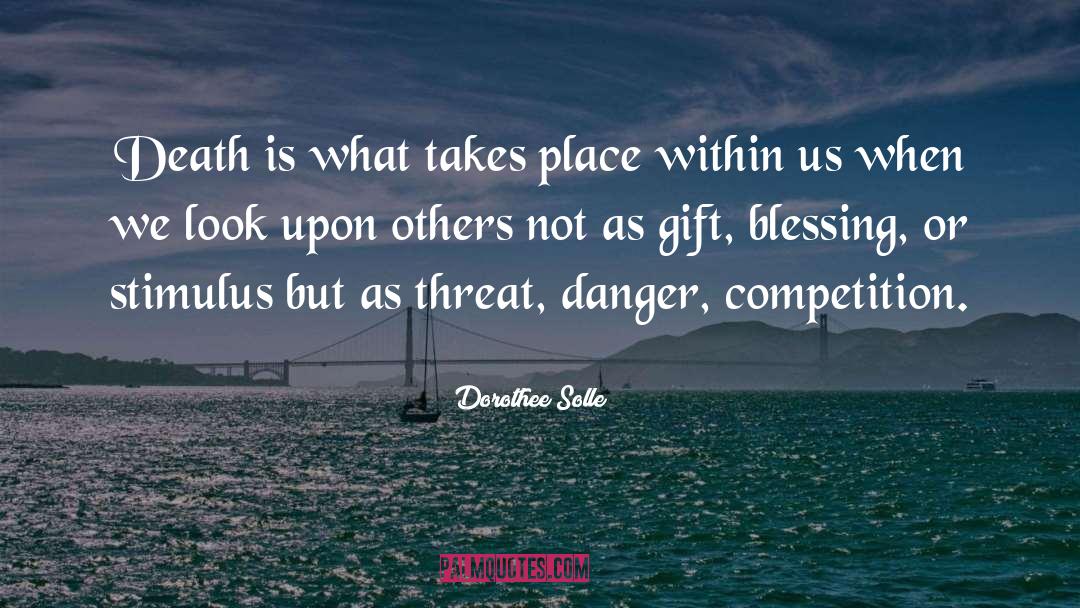
This is the purpose of theology. By it my life becomes clearer and more conscious.
